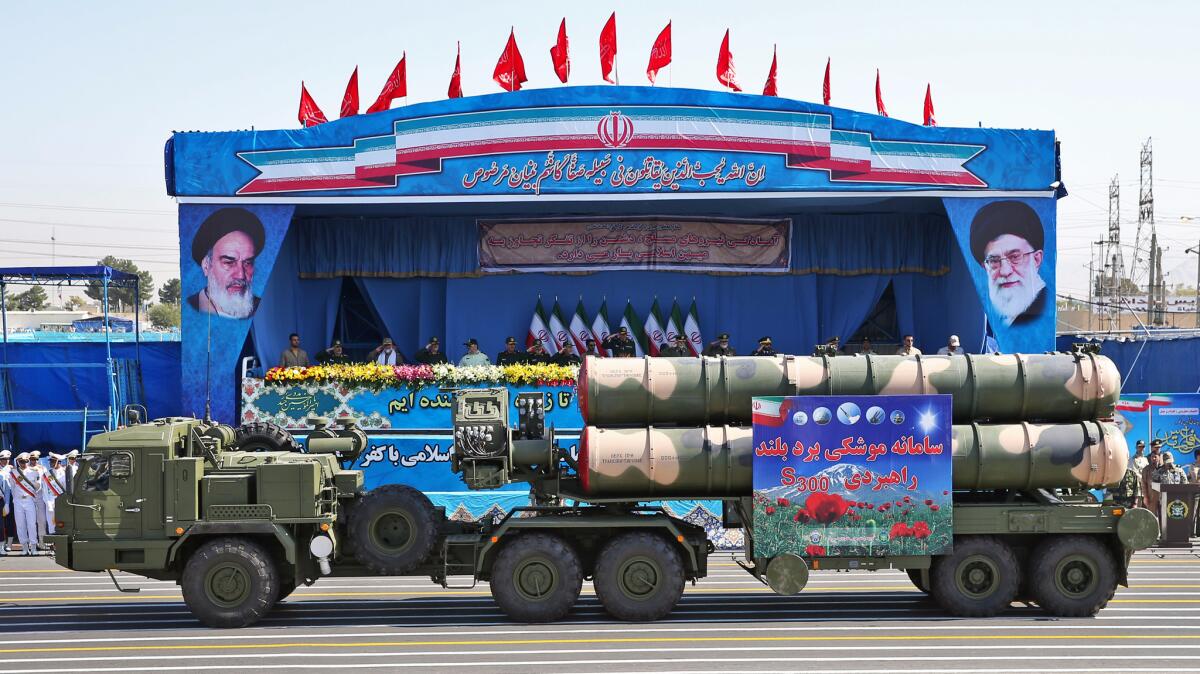Op-Ed: Why Iran is more dangerous than Islamic State

- Share via
U .S. political leaders of both parties argue that destroying Islamic State is America’s top priority in the Middle East. In reality, that’s not nearly as important as confronting the challenge posed by Iran. The nuclear deal that went into effect a year ago may have postponed the danger of an Iranian nuclear bomb, but the multifaceted threat of a militaristic, messianic Iran — 80-million strong — is much more menacing to Western interests than the Sunni thugs and murderers of Raqqah and Mosul.
In negotiating the nuclear agreement, the P5+1 group of countries — the United States, Russia, China, Britain, France and Germany — registered several benefits. These include delaying the Iranian military nuclear project for 10 to 15 years, defusing political tensions with Iran, opening new markets there, and gaining Iranian cooperation in the fight against Islamic State. Only one of these — the delay in Iran’s nuclear program — comes at Iran’s expense, since both sides shared a desire to achieve the other objectives.
From Tehran’s perspective, it gained much more than it gave up. In exchange for postponing its military nuclear project, it achieved the lifting of many economic sanctions, an end to its political isolation and the loosening of restrictions on its ballistic missile program.
And out of the P5+1’s exaggerated fear of taking any steps that might give the Iranians an excuse to scuttle the deal, Tehran won a lot more too. This includes wide latitude to advance its influence throughout the region as it no longer fears a U.S.-led “military option.”
The Iranian negotiators were brilliant. They played a weak hand superbly.
The evidence of Iran’s rogue behavior is overwhelming. It is the prime backer of the genocidal Syrian regime, providing President Bashar Assad with funds, weapons and the support of Shiite militias. It supplies weapons, money and training to Hezbollah, using it as a strategic tool to undermine the legitimate role of the Lebanese government. In Yemen, Iran fans conflict by sending arms to the Houthi rebels. Elsewhere in the Arabian peninsula, it uses proxies to undermine Bahrain and Saudi Arabia. In Israel’s neighborhood, Iran finances Palestinian Islamic Jihad and certain Hamas elements and provides them with the know-how to produce rockets, drones and other weapons. None of this has abated with the Iran nuclear deal; to the contrary, Iran has grown more aggressive on all fronts.
For an agreement that was supposed to be narrowly limited to finding a peaceful solution to Iran’s military nuclear program, the Iranian negotiators were brilliant. They played a weak hand superbly. And in 14 years, when critical restrictions will be lifted, the world may be in a worse position to prevent Iran’s nuclear project than ever before.
In history and international politics, 14 years is the blink of an eye. And there are many factors — such as the possibility of global events that distract international attention from Iranian violations — that could shrink that time frame significantly.
Concerned nations need to work together now to prevent Iran from exploiting the nuclear deal to redraw the political map of the Middle East in its favor and from capitalizing on the region’s instability to prepare for an eventual nuclear breakout, either before or after the deal’s expiration.
Such steps would include ensuring strict inspection of Iran’s nuclear facilities — and not just by the International Atomic Energy Agency. After all, the vast majority of Iran’s nuclear violations were exposed by western intelligence agencies, not the IAEA. In addition, concerned nations need to pressure Iran on its ballistic missile program and support for terrorism. They must also work to enforce U.N. Security Council resolutions that prohibit Iran’s proliferation of weapons throughout the region. None of these steps, by the way, violates the terms of the nuclear deal.
It is not too late to repair the impression that the West — led by the United States — views Iran as part of the solution to the problems of the Middle East, rather than the chief source of the region’s instability and radicalism. Of course, Iran fights Islamic State; the fact that the world’s leading radical Shiite government fights radical Sunnis should come as no surprise.
Those who believed that the nuclear agreement would lead to a more moderate, open, reformist Iran, at home and abroad, regrettably suffer from wishful thinking. So long as the ayatollah’s regime governs Iran, there is no chance we will see a McDonald’s in Tehran. Instead, we will see more executions, more repression, more tyranny.
This view of Iran is shared across the Middle East by countries that used to be antagonists. While the struggle between Israelis and Palestinians persists, any reference to the conflict between Israel and Sunni Arab states is, for now, obsolete. Today, Arabs and Israelis are in the same boat, facing Iranian-backed threats all around us; in terms of how to address these threats, we are also generally on the same page.
What we lack is leadership from our traditional allies in the West, especially our good friends in America. Should President Obama or his successor shift priorities and lead a campaign to pressure Iran to end its destabilizing policies — applying the same type of pressure that forced Iran to negotiate on its nuclear program — it will find willing partners among both Arabs and Israelis.
Moshe Ya’alon, the Rosenblatt Distinguished Fellow at the Washington Institute, served until May 2016 as Israel’s minister of defense.
Follow the Opinion section on Twitter @latimesopinion and Facebook
A cure for the common opinion
Get thought-provoking perspectives with our weekly newsletter.
You may occasionally receive promotional content from the Los Angeles Times.






